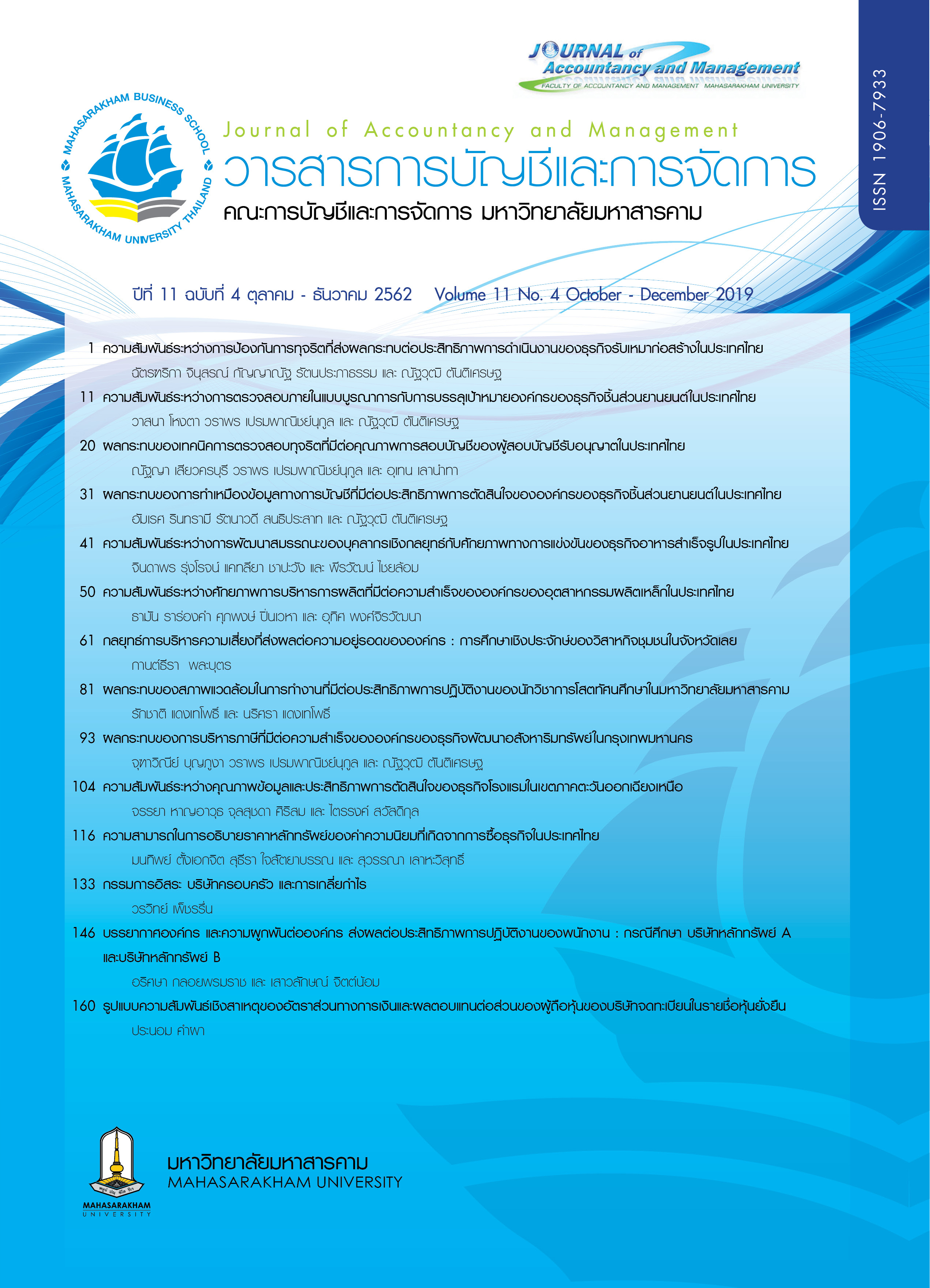กรรมการอิสระ บริษัทครอบครัว และการเกลี่ยกำไร
Main Article Content
บทคัดย่อ
งานวิจัยนี้มีวัตถุประสงค์เพื่อศึกษาความสัมพันธ์ของกรรมการอิสระและการเกลี่ยกำไร รวมทั้งผลกระทบของบริษัทครอบครัวต่อประสิทธิผลของกรรมการอิสระ กลุ่มตัวอย่างเป็นบริษัทจดทะเบียนในตลาดหลักทรัพย์แห่งประเทศไทยและตลาด เอ็ม เอ ไอ ที่ไม่ใช่บริษัทในกลุ่มอุตสาหกรรมการเงิน จำนวน 479 บริษัท โดยรวบรวมและวิเคราะห์ข้อมูลทางการเงินของบริษัทตัวอย่างในช่วงปี พ.ศ. 2551 ถึง พ.ศ. 2560 ด้วยการวิเคราะห์ถดถอยพหุคูณ ผลการศึกษาพบว่า โดยรวมกรรมการอิสระไม่มีความสัมพันธ์กับการเกลี่ยกำไรอย่างเป็นนัยสำคัญ อย่างไรก็ตาม เมื่อทำการวิเคราะห์โดยแบ่งกลุ่มตัวอย่างเป็นกลุ่มบริษัทครอบครัวและที่ไม่ใช่บริษัทครอบครัว พบหลักฐานว่า กรรมการอิสระมีความสัมพันธ์เชิงลบต่อการเกลี่ยกำไรในกลุ่มตัวอย่างที่ไม่ใช่บริษัทครอบครัวอย่างมีนัยสำคัญแต่ไม่พบหลักฐานความสัมพันธ์ดังกล่าวในกลุ่มบริษัทครอบครัว การวิเคราะห์โดยเพิ่มตัวแปรปฏิสัมพันธ์ระหว่างกรรมการอิสระกับบริษัทครอบครัวพบว่า บริษัทครอบครัวส่งผลกระทบทางลบต่อประสิทธิผลของกรรมการอิสระในการกำกับดูแลการรายงานทางการเงินอย่างเป็นนัยสำคัญ
Downloads
Article Details
บทความที่ได้รับการตีพิมพ์เป็นลิขสิทธิ์ของวารสารการบัญชีและการจัดการ
ข้อความที่ปรากฏในบทความแต่ละเรื่องในวารสารวิชาการเล่มนี้เป็นความคิดเห็นส่วนตัวของผู้เขียนแต่ละท่านไม่เกี่ยวข้องกับมหาวิทยาลัยมหาสารคาม และคณาจารย์ท่านอื่นๆในมหาวิทยาลัยฯ แต่อย่างใด ความรับผิดชอบองค์ประกอบทั้งหมดของบทความแต่ละเรื่องเป็นของผู้เขียนแต่ละท่าน หากมีความผิดพลาดใดๆ ผู้เขียนแต่ละท่านจะรับผิดชอบบทความของตนเองแต่ผู้เดียว
เอกสารอ้างอิง
ตลาดหลักทรัพย์แห่งประเทศไทย. (2555). กรรมการอิสระและกรรมการตรวจสอบ. สืบค้น 22 กรกฎาคม 2562, จาก https://www.set.or.th/th/regulations/simplified_regulations/AC_ID_p1.html?printable=true
วรวิทย์ เพ็ชรรื่น และสุภาพร ดอกไม้ทอง. (2562). ความสัมพันธ์ของการกำกับดูแลกิจการที่ดีกับการตกแต่งบัญชี :
หลักฐานจากบริษัทจดทะเบียนของไทย. วารสารบริหารธุรกิจ เศรษฐศาสตร์และการสื่อสาร, 14(3), 133-145.
Bradbury, M., Mak, Y. T., & Tan, S. (2006). Board characteristics, audit committee characteristics and
abnormal accruals. Pacific accounting review, 18(2), 47-68.
Chen, X., Cheng, Q., & Wang, X. (2015). Does increased board independence reduce earnings management? Evidence from recent regulatory reforms. Review of Accounting Studies, 20(2), 899-933.
Cheng, A. C. S., Liu, Z. C., & Thomas, W. (2012). Abnormal Accrual Estimates and Evidence of Mispricing. Journal of Business Finance & Accounting, 39(1‐2), 1-34. doi: 10.1111/j.1468-5957.2011.02274.x
Copeland, R. M. (1968). Income smoothing. Journal of accounting research, 6, 101-116.
Dechow, P. M., Sloan, R. G., & Sweeney, A. P. (1995). Detecting earnings management. The accounting
review, 70(2), 193-225.
Eckel, N. (1981). The Income Smoothing Hypothesis Revisited. Abacus, 17(1), 28-40.
Gao, L., & Zhang, J. H. (2015). Firms’ earnings smoothing, corporate social responsibility, and valuation.
Journal of Corporate Finance, 32, 108-127.
Graham, J. R., Harvey, C. R., & Rajgopal, S. (2005). The economic implications of corporate financial
reporting. Journal of accounting and economics, 40(1-3), 3-73.
Hutchinson, M. R., Percy, M., & Erkurtoglu, L. (2008). An investigation of the association between corporate governance, earnings management and the effect of governance reforms. Accounting Research Journal, 21(3).
Jaggi, B., Leung, S., & Gul, F. (2009). Family control, board independence and earnings management:
Evidence based on Hong Kong firms. Journal of Accounting and Public Policy, 28(4), 281-300.
Jones, J. J. (1991). Earnings management during import relief investigations. Journal of accounting research, 29(2), 193-228.
Klein, A. (2002). Audit committee, board of director characteristics, and earnings management. Journal of
accounting and economics, 33(3), 375-400.
Kothari, S. P., Leone, A. J., & Wasley, C. E. (2005). Performance matched discretionary accrual
measures. Journal of accounting and economics, 39(1), 163-197.
Leuz, C., Nanda, D., & Wysocki, P. D. (2003). Earnings management and investor protection: an
international comparison. Journal of financial economics, 69(3), 505-527.
Levitt, A. (1998). The numbers game. The CPA Journal, 68(12), 14-19.
Lhaopadchan, S., Budsaratragoon, P., & Hillier, D. (2016). Earnings Management, Corporate
Governance and Insider Trading: Evidence from Thailand. Chulalongkorn Business Review,
(3), 107-156.
Mansor, N., Che-Ahmad, A., Ahmad-Zaluki, N., & Osman, A. (2013). Corporate governance and
earnings management: A study on the Malaysian family and non-family owned PLCs. Procedia
Economics and Finance, 7, 221-229.
Monetary Authority of Singapore. (2012). Code of Corporate Governance. Retrieved July 22, 2019 from
https://www.mas.gov.sg/-/media/MAS/resource/fin_development/corporate_governance/
CGCRevisedCodeofCorporateGovernance3May2012.pdf
Peasnell, K. V., Pope, P. F., & Young, S. (2005). Board monitoring and earnings management: Do
outside directors influence abnormal accruals? Journal of Business Finance & Accounting,
(7-8), 1311-1346.
Persons, O. S. (2006). Corporate governance in Thailand: what has been done since the 1997 financial
crisis? International Journal of Disclosure and Governance, 3(4), 288-305.
Prencipe, A., & Bar-Yosef, S. (2011). Corporate governance and earnings management in family-
controlled companies. Journal of Accounting, Auditing & Finance, 26(2), 199-227.
Securities Commission Malaysia. (2017). Malaysian Code On Corporate Governance. Retrieved July 22,
from https://www.sc.com.my/api/documentms/download.ashx?id=70a5568b-1937-4d2b-
cbf-3aefed112c0a
Shen, C. H., & Chih, H. L. (2007). Earnings management and corporate governance in Asia's emerging
markets. Corporate Governance: An International Review, 15(5), 999-1021.
Thoopsamut, W., & Jaikengkit, A. (2009). Audit committee characteristics, audit firm size and quarterly
earnings management in Thailand. Oxford Journal, 8(1), 3-12.
Tucker, J. W., & Zarowin, P. A. (2006). Does income smoothing improve earnings informativeness? The
accounting review, 81(1), 251-270.


